Filter by

The Ethics of Energy Sustainability
This book is an easy to use instructional aide. Explore sustainability issues in contemporary society through a transdisciplinary approach. Chapters include ethics, public resources, public policy, combustion, heat exchangers, nuclear, solar, water, and wind energy. A short summary is presented for each topic, followed by additional topics for research, assignments, and references. The complex …
- Edition
- 1
- ISBN/ISSN
- 978-94-017-9701-6
- Collation
- XIII, 71, 10 b/w illustrations, 2 illustrations in colour
- Series Title
- -
- Call Number
- -
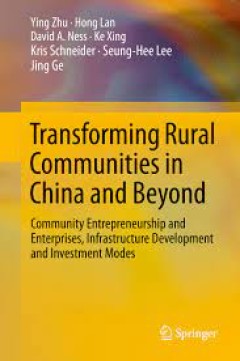
Transforming Rural Communities in China and Beyond Community Entrepreneurshi…
This book represents one of the first attempts by a multidisciplinary research team, encompassing the social sciences, business, architecture and planning, engineering, and finance and economics, to help rural communities discover sustainable and self-reliant paths to development and transformation. The opening chapter outlines the background of the research, its importance in the context of…
- Edition
- -
- ISBN/ISSN
- 978-3-319-11319-7
- Collation
- -
- Series Title
- -
- Call Number
- -

Transforming Payment Systems in Europe
The European payment market has undergone rapid transformation in recent years due to changes in payment habits, new business rules and new legal frameworks and regulation. There has also been an advent of new technologies and payment solutions which has altered the European payments landscape drastically. This book provides an overview of the fundamental issues involved in this new payments…
- Edition
- -
- ISBN/ISSN
- 978-1-137-54121-5
- Collation
- -
- Series Title
- -
- Call Number
- -

A Course on Cooperative Game Theory
Cooperative game theory deals with situations where objectives of participants of the game are partially cooperative and partially conflicting. It is in the interest of participants to cooperate in the sense of making binding agreements to achieve the maximum possible benefit. When it comes to distribution of benefit/payoffs, participants have conflicting interests. Such situations are usually …
- Edition
- -
- ISBN/ISSN
- 9781107415997
- Collation
- -
- Series Title
- -
- Call Number
- -

The Economics of the Popular Music Industry
This Palgrave Pivot uses modeling from microeconomic theory and industrial organization to demonstrate how consumers and producers have responded to major changes in the music industry. Byun examines the important role of technology in changing its structure, particularly as new methods of creating and accessing music prove to be a double-edged sword for creators and producers. An underlying th…
- Edition
- 1
- ISBN/ISSN
- 978-1-137-46705-8
- Collation
- VIII, 128
- Series Title
- -
- Call Number
- -
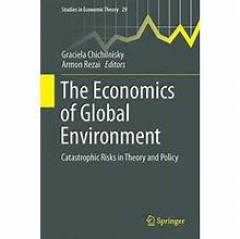
The Economics of the Global Environment
This is the first book combining research on the Global Environment, Catastrophic Risks and Economic Theory and Policy. Modern economic theory originated in the middle of the twentieth century when industrial expansion coupled with population growth led to a voracious use of natural resources and global environmental concerns. It is uncontested that, for the first time in recorded history, huma…
- Edition
- 1
- ISBN/ISSN
- 978-3-319-31943-8
- Collation
- VII, 649, 30 b/w illustrations, 46 illustrations in colour
- Series Title
- -
- Call Number
- -
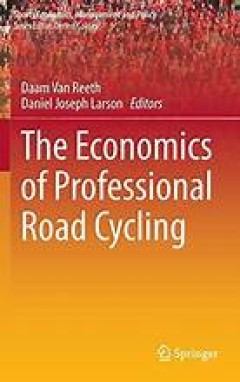
The Economics of Professional Road Cycling
Over the past decade, a growing body of academic literature on the economics of road cycling has been amassed. This book is the first volume to bring together a majority of the academic research and knowledge on the economics and management of professional road cycling. Each chapter treats a particular economic aspect of the sport, from organizational structure to marketing, labor, game theory,…
- Edition
- 1
- ISBN/ISSN
- 978-3-319-22312-4
- Collation
- X, 341,
- Series Title
- Sports Economics, Management and Policy
- Call Number
- -
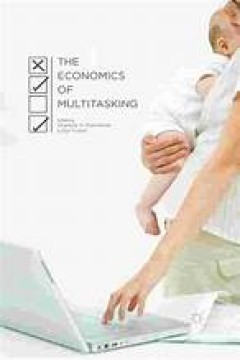
The Economics of Multitasking
People regularly multitask, though we have been warned about the mental costs of "task-switching" in psychology and the popular press. Meanwhile, economists have remained silent on the possible economic ramifications – both good and bad – of producers and/or consumers doing more than one thing at once. This first-of-its-kind volume explores the frequency, patterns, and economic implications…
- Edition
- 1
- ISBN/ISSN
- 978-1-137-38144-6
- Collation
- XV, 216
- Series Title
- -
- Call Number
- -
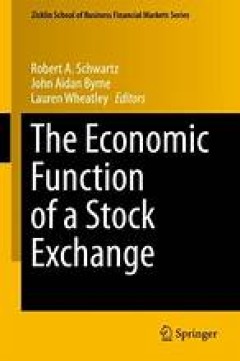
The Economic Function of a Stock Exchange
In recent years, exchanges on both sides of the Atlantic have been extensively reengineered, and their organizational structures have changed from non-profit, membership organizations to for-profit, demutualized organizations. Concurrently, new alternative trading systems have emerged and the traditional functions of broker/dealer firms have evolved. How have these changes affected the delivery…
- Edition
- 1
- ISBN/ISSN
- 978-3-319-10350-1
- Collation
- XXV, 129, 2 b/w illustrations, 13 illustrations in colour
- Series Title
- Zicklin School of Business Financial Markets Series
- Call Number
- -

A Course in Public Economics
A Course in Public Economics, first published in 2004, explores the central questions of whether or not markets work, and if not, what is to be done about it. The first part of the textbook, designed for upper-level undergraduates and first-year graduate students, begins with an extended discussion of the two theorems of welfare economics. These theorems show that competitive markets can give r…
- Edition
- -
- ISBN/ISSN
- 9780511754180
- Collation
- -
- Series Title
- -
- Call Number
- -
 Computer Science, Information & General Works
Computer Science, Information & General Works  Philosophy & Psychology
Philosophy & Psychology  Religion
Religion  Social Sciences
Social Sciences  Language
Language  Pure Science
Pure Science  Applied Sciences
Applied Sciences  Art & Recreation
Art & Recreation  Literature
Literature  History & Geography
History & Geography